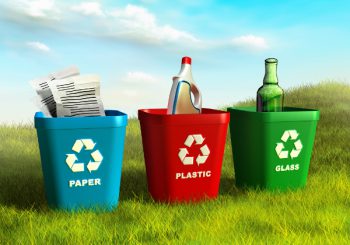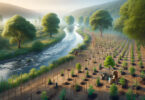By Jane Marsh
Guest Writer for Wake Up World
As the world continues to experience drastic climate change effects, more people want to go green. Pitching in to save the planet is an admirable feat that might make you feel better about the future. You’re proud of each bag that ends up in your local recycling plant, but do you know where it goes from there? People have begun to wonder if recycling is good for the environment and what really happens with their household waste.
[pro_ad_display_adzone id=”110028″]
This guide takes a deep dive into the issue so you can make informed decisions about your carbon footprint. There are many ways to reduce waste and help the planet, but they all start with a bit of research.
Is It Worth It to Recycle?
Recycling became popular when World War II made it a central part of helping the U.S. win the war. Households saved their tin cans and toothpaste tubes so they could become supplies for troops. Environmentalists saw the popularity growing and used it to pursue legislation that transformed recycling into a national environmental resource.
These are a few benefits the world gets when people recycle waste properly. They can make a big difference, even if you don’t think separating aluminum and cardboard does much for the environment.
It Saves Electricity
Production factories need electricity to make each product. When they use recycled aluminum cans to make new ones, they save 95% of the energy it would take to make one with traditional materials. Using less electricity is better for the environment because electric plants produce CO2 to keep everything running.
It Reduces Landfill Usage
Landfills hold onto waste and allow it to break down naturally, but that takes time and creates pollution. As materials decompose, they release harmful methane gas that traps heat in the atmosphere and intensifies climate change.
It Preserves Natural Resources
Recycling things like paper bags and glass allows them to transform into new versions of the same product. You won’t fund efforts like deforestation to continue producing goods because paper and cardboard become reusable. Always ensure that you’re complying with local waste regulations so nothing gets redirected to landfills because of improper disposal.
Is Recycling Harmful to the Environment?
There are a few specific ways that recycling can result in environmental harm. It surprises many people to learn that an eco-friendly practice might expand their carbon footprint, but only if the following factors occur.
It Reduces Composting
Composting occurs when materials break down into nutrients that help the environment. Some waste does this after decaying in landfills, like printer paper. Recycling keeps essential nutrients from supporting local plants and animals by encouraging new foliage growth with natural fertilizer.
It Excuses More Waste
Some people may recycle their soda cans and feel justified in throwing everything else out. Their efforts help the planet, but they might use recycling as an excuse to ignore other harmful waste management practices.
It Covers Up Worse Problems
Corporations quickly jumped on board with recycling. It’s why you’ll see the three-arrow symbol on plastic bottles and containers. They want people to buy their product because they support saving the planet, but most consumers won’t look behind the scenes to ensure that the company really went green.
Coca-Cola pays for recycling advertisements and always recommends that consumers recycle their products, but the 2020 Break Free From Plastic audit named it the world’s biggest plastic polluter anyway. A corporation may look like they want to use efforts like recycling to help the planet, but that isn’t always the truth. Sometimes the promise of recycling can cover up how the company contributes to climate change behind the scenes.
Should People Still Recycle?
Everyone must decide to recycle based on their preferences. Leaving separated materials with your local recycling plant likely won’t directly harm the environment. It’s one way to make the earth greener that doesn’t increase daily costs for consumers.
Research is the best way to ensure that your recycling helps the earth. Look up how the closest recycling plant processes waste and where it goes from there. You’ll understand the process more clearly and can redirect your recycling to better plants if needed.
Are There Recycling Alternatives For Waste?
Reusing materials is the best alternative to recycling. If you can’t find a trusted recycling facility, make a compost bin to reduce how much household waste goes to a landfill. Many materials that would otherwise get recycled, like cardboard and newspaper, can break down in a compost bin and turn into fertilizer for your garden.
You might also consider burning waste in your backyard to keep it from landfills and recycling plants, but that’s bad for two reasons. Burning materials release dioxins into the atmosphere and pollute the air. The airborne chemicals may also trigger harmful respiratory ailments and heart disease. It’s safer for you and the planet if you hand household waste to processing plants.
Can People Go Green Without Recycling?
Whether you invest in reusable products or compost your recycling materials, you can continue to improve the environment without a recycling bin. Try a few simple ideas that make life more enjoyable, like:
- Planting local flowers to help pollinators
- Switching to eco-friendly light bulbs
- Driving your car less frequently
Recycling can be a great tool, but it’s not your only option to reduce your carbon footprint. See if any other sustainable habits fit with your green lifestyle to improve your planetary impact.
The Verdict: Recycling Can Help or Hurt
There’s no easy answer when someone asks if recycling is good for the environment. Sometimes it helps by reusing materials, but it can also cause more waste to go in landfills. Researching local plants and investigating where your recyclables go are just a few ways to get started with a greener life.
Recommended articles by Jane Marsh:
- How Animals Are Essential For Our Health
- 10 Ways You can Help Wildlife in Your Backyard
- 10 Tips for Living an Eco-Friendly Life With Your Pet
- 10 Physical and Mental Benefits of Houseplants
- How Switching to a Pescatarian Diet Benefits the Planet
- Should You Have Renewable Energy Installed in Your Home?
- 10 Ways to Increase Your Home’s Sustainability This Winter
- The Best Sustainable Resolutions for 2021
- How You Can Cut Carbon From Your Diet
- 10 Ways to Reduce Your Waste this Holiday Season
About the author:
 Jane is the founder and editor-in-chief of Environment.co where she shares practical tips on how to live a greener life.
Jane is the founder and editor-in-chief of Environment.co where she shares practical tips on how to live a greener life.
[pro_ad_display_adzone id=”110027″]



